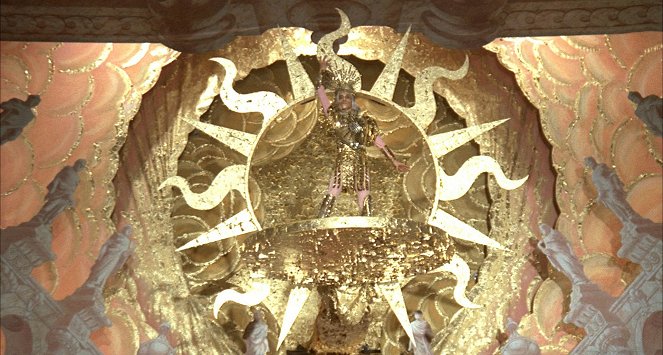Regie:
Federico FelliniDrehbuch:
Federico FelliniKamera:
Giuseppe RotunnoMusik:
Nino RotaBesetzung:
Donald Sutherland, Tina Aumont, Dudley Sutton, Reggie Nalder, Diane Kurys, Chesty Morgan, Sandra Elaine Allen, Daniel Emilfork, Mary Marquet (mehr)Inhalte(1)
Federico Fellini's darkest film cracks through the myth of Giacomo Casanova. As played by Donald Sutherland, the notorious womanizer is presented as a pitiable and terrifying figure. Casanova craves respect as a scholar and yearns to pursue his interest in alchemy. A sex scandal lands him in prison, but an escape to Paris provides him a new lease of life. Yet every Court in Europe and its attendant patrons and hostesses will only entertain him if he lives up to his reputation in the ritual displays of sex and courtship which form part of the daily life of 18th Century Europe. Fellini had dealt with the theme of the frustration of human desires in La Dolce Vita. In Casanova, the nobleman's search for happiness achieves tragedy, a painful reflection of the human condition. (Mr. Bongo Films)
(mehr)Kritiken (2)
Federico Fellinis Casanova hat etwas von Baron Münchhausen, Lemuel Gulliver, Vicomte de Valmont, aber Barry Lyndon sucht man vergebens. Opulent, üppig und doch zart, zerbrechlich und tröstlich ist das Bild seines Lebens. Fellini arbeitet seine typischen filmischen Schnörkel an der Seite einer Ein-Mann-Geschichte aus, aber schließlich ist es das Gesicht von Donald Sutherland, das hier in Marmor gemeißelt ist. Ich bin in der Tat weit davon entfernt, eine zufriedene und vor allem glückliche Konsumentin von Fellini zu werden, aber diesem Mann der Renaissance könnte ich noch deutlich mehr abgewinnen. Sein Leben, das in Dux so verschwenderisch beendet wurde, verlangt es direkt. Ebenso wie die Renaissance seine mechanischen Geliebten. Schließlich habe ich einen großen Nachholbedarf - bisher habe ich nur Der schüchterne Casanova (1936), Tom und ich auf Brautschau (1951), Casanova '70 (1965), Flucht nach Varennes (1982), Casanova - Ich liebe alle Frauen (2002), Casanova (2005) und Casanova (2005) gesehen, was gar nichts ist, und vorerst würde ich gerne noch Skandal in der Casanova-bar (1929) sehen.
()
Pier Paolo Pasolini vs. Federico Fellini. Salo, or The 120 Days of Sodom vs. Fellini's Casanova: the score is one to nothing. What do both films have in common? It is the effort to go through allegory and analogy to the furthest extreme of the depicted topic, to explore the very limits of the matter through metaphor, and even to go just beyond those limits where the true nature of the matter is revealed. Both films portray the vanity and debauchery of seemingly noble life (of the higher classes, although this detail probably did not matter to Fellini), the hidden essence of human entertainment, which quickly turns into a sneer and depraved orgies, etc. Yet while Pasolini had the courage to undergo this cinematic game of searching for the ultimate extreme, where society and film can essentially reach to metaphorically depict all of this, Fellini stops somewhere halfway. Fellini's Casanova is not surprising in any way - in fact, Americans could have made it, they just would have to find a European who would package the film in pastels and tinsel a la Rococo. Well, it is no wonder that Fellini won several Oscars in his career, while Pasolini received a different honor the year before, which speaks much more about his art than Fellini's golden statue (and I am back to that tinsel, Mr. Fellini, where are your earlier films...).
()
Galerie (81)
Photo © Gaumont


Werbung